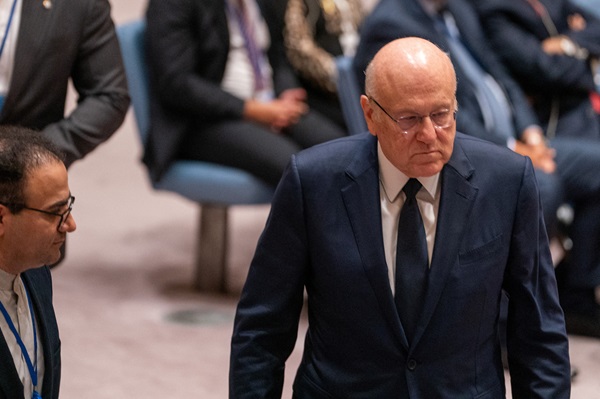 Lebanon's caretaker Prime Minister, Najib Mikati at the United Nations Security Council meeting on the escalation in fighting in Lebanon between Israel and Hezbollah in New York, US, on 25 September 2024.;
Credit: REUTERS/David Dee Delgado
Lebanon's caretaker Prime Minister, Najib Mikati at the United Nations Security Council meeting on the escalation in fighting in Lebanon between Israel and Hezbollah in New York, US, on 25 September 2024.;
Credit: REUTERS/David Dee Delgado
UNITED NATIONS/BEIRUT/JERUSALEM (Reuters) - Lebanese Prime Minister Najib Mikati has expressed hope that a ceasefire could be reached soon to end fighting between Israel and Iran-backed Hezbollah that has shaken his country and raised fears of a ground invasion.
The United States, France and several allies called for an immediate 21-day ceasefire across the Israel-Lebanon border while also expressing support for a ceasefire in Gaza following intense discussions at the United Nations on Wednesday 25 September 2024.
Mikati welcomed the call for a truce but said the key to its implementation is whether Israel, which has been moving troops closer to Lebanon, is committed to enforcing international resolutions. Asked if a ceasefire could be secured soon, Mikati told Reuters: "Hopefully, yes."
Mikati’s caretaker administration includes ministers chosen by Hezbollah, widely seen as the country’s most powerful political force.
The ceasefire would apply to the Israel-Lebanon "Blue Line," the demarcation line between Lebanon and Israel, and would allow the parties to negotiate towards a potential diplomatic resolution of the conflict, a senior Biden administration official said.
UN Special Coordinator for Lebanon Jeanine Hennis-Plasschaert on Thursday welcomed the call for an immediate 21-day ceasefire to allow the space for diplomacy to succeed.
AIRSTRIKES POUND LEBANON
Israel has made a priority of securing its northern border and allowing the return there of some 70,000 residents displaced by near-daily exchanges of fire since war broke out in October between Israel and Hamas in Gaza on Israel's southern border.
Israel widened its airstrikes in Lebanon on Wednesday and at least 72 people were killed, according to a Reuters compilation of Lebanese health ministry statements. The ministry earlier said at least 223 were wounded.
Israel's military chief said a ground assault was possible, raising fears the conflict could spark a wider Middle East war.
Over the last several months, Washington has been engaging with officials in Israel and Lebanon to reduce hostilities, a senior Biden administration official said.
Israel's UN Ambassador Danny Danon told reporters before a UN Security Council meeting on Wednesday that Israel would welcome a ceasefire and preferred a diplomatic solution. He then told the Security Council that Iran was the nexus of violence in the region and peace required dismantling the threat.
World leaders voiced concern that the conflict - running in parallel to Israel's war in Gaza against Palestinian Hamas militants also backed by Iran - was escalating rapidly as the death toll rose in Lebanon and thousands fled their homes.
Israeli airstrikes this week have targeted Hezbollah leaders and hit hundreds of sites deep inside Lebanon, where hundreds of thousands have fled the border region, while the group has fired barrages of rockets into Israel.
Hezbollah has suffered heavy blows recently. Some of its senior commanders have been assassinated and thousands of communications devices used by its members have exploded, causing deaths and injuries.
Lebanese hospitals have filled with the wounded since Monday, when Israeli bombing killed more than 550 people in Lebanon's deadliest day since its civil war ended in 1990.








